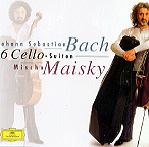Your opinion about this new set of Bach cello suites from Mischa Maisky will depend on how much Maisky you prefer with your Bach. Or, to put it another way, how amenable you are to the trend toward increasing assertiveness by performers in pushing the limits of notation and style. Now this can be a good thing, except when it appears to have no musical or artistic purpose, or when it misrepresents the score so severely that we are presented with virtually a different composition. My own judgment here is colored by Maisky’s first recorded traversal of the suites, which has remained one of my two favorite versions (the other being Mari Fujiwara’s on Denon) ever since its issue in 1985. However, these new readings, which apparently were sparked by Maisky’s horror at hearing a selection from the earlier set on a hi-fi store demo recording and thinking it was a “parody” of his own playing, should come with a warning sticker: “Any resemblance to Bach’s original composition is purely accidental.” It seems as if the cellist takes Bach’s score merely as his starting point, from which he launches his own very personal, and transforming, commentary.
Nearly every movement in the new version is faster, often considerably so. Not that timing is everything, but since this is such a consistent feature of these performances, you have to suspect that there’s a conscious decision behind it. My question is, is this a product of new insight or is it just different? It’s definitely different, and right from the first bar of the Prelude to the G major suite you’re plunged headlong into a world of souped-up, hyperventilated sound and fury that mostly ends up cluttering Bach’s wonderfully lean lines and clear textures. Maisky’s new interpretive ideas actually work well in some places, especially in the darker, moodier sections of the D minor suite, where the complex minor-key harmonies emerge with somewhat greater coherence. And there can be no doubt about Maisky’s technique being fully intact and still formidable. The playing is commanding and confident and technically flawless. His cello, too, has one of the sweetest yet most full-bodied timbres you’ll ever hear. Surprisingly, there’s little difference in the sound between this and the 1985 recording. And it’s hard to quarrel with Maisky’s love of and respect for Bach (“If I could say that music is my religion, then these suites are the Bible”), nor would I presume to question this fine musician’s integrity or sincerity.
However, the question of phrasing, perhaps the most important element in any performance of the suites, is another matter. I have serious trouble with many of Maisky’s choices and means of delineation of phrasing and the attendant dynamics. There are countless passages throughout all of the suites where the lines are uncomfortably choppy, overloaded with too much punctuation–like a sentence with too many commas. And, as in the Gigue of the C major suite, the interpretive liberties Maisky takes are sometimes so outlandish that you have to wonder at the sheer audaciousness. I suppose I’m looking for signs of the humility–an important attribute for those who approach and interpret such monumental Bach masterpieces–that Maisky clearly exhibited in his performances and recordings 15 years ago. But this is an attribute that is fast disappearing from many of today’s preeminent soloists–Yo-Yo Ma’s “Inspired by Bach” is just another example.
Maisky likes to suggest that “Bach was the greatest romantic” and takes pride in accusations that he performs his music “romantically”. So be it. But I would argue that Bach was not a romantic in today’s meaning of the term, and modern attempts to interpret his music as if he were, that is, forcing it into some kind of artificial context, rob it of the very qualities that make it timeless. If this is your style, check this out if you must–at least it comes with a very cool CD-ROM interactive score, complete with Maisky’s own fingerings, MIDI compatibility, and a variety of playback features that would be a welcome addition to many classical recordings. Otherwise, go for Maisky’s first recording–or for the sumptuously lyrical Fujiwara or Pieter Wispelwey’s rock-solid, faithful-to-the-score renditions for Channel Classics.
































